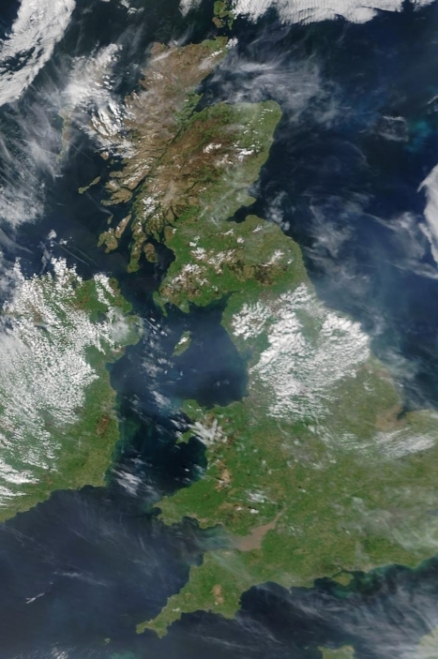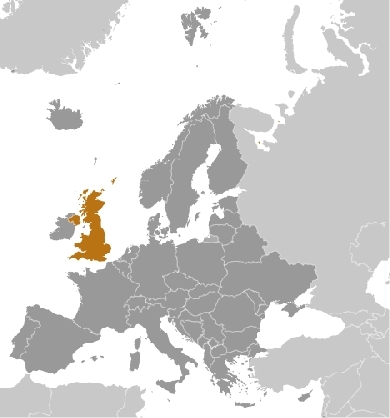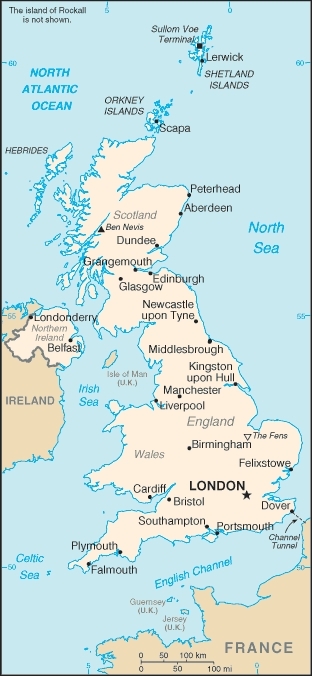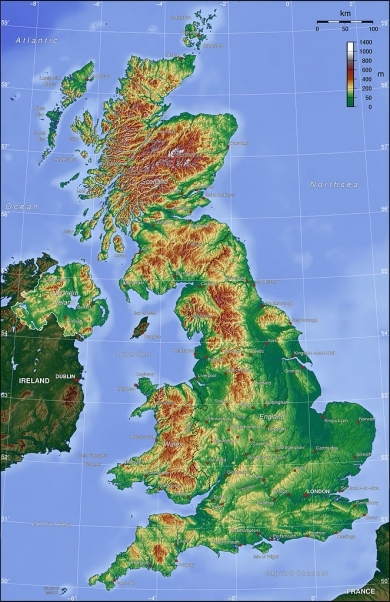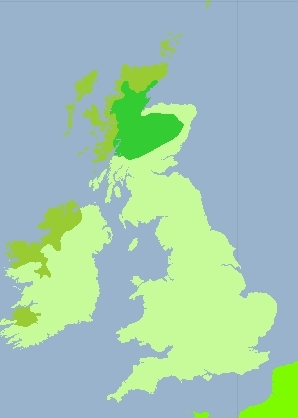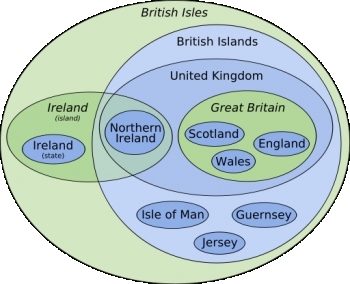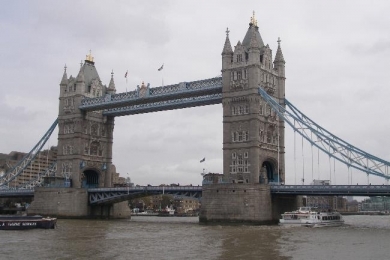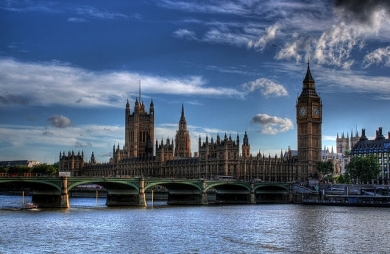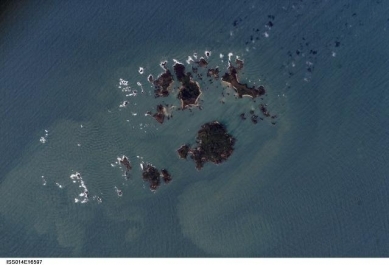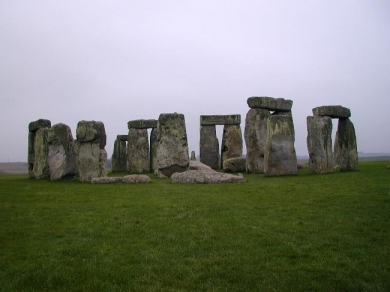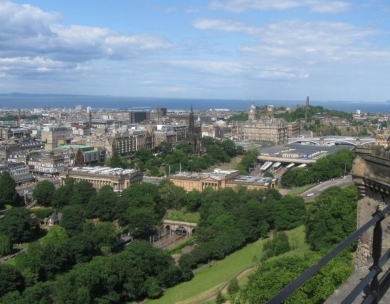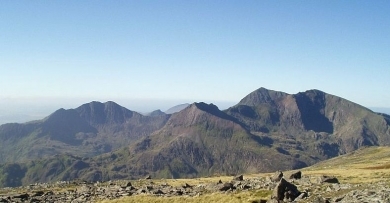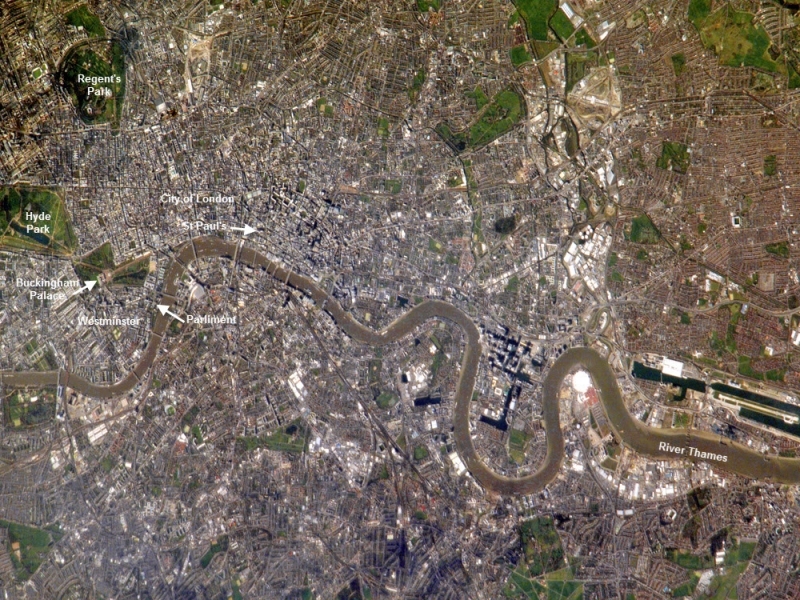United Kingdom
Countries and Regions of the World Collection  The United Kingdom (UK) is a nation of sixty three million people in western Europe composed of England, Scotland, Wales, and Northern Ireland.
The United Kingdom (UK) is a nation of sixty three million people in western Europe composed of England, Scotland, Wales, and Northern Ireland.
England, Scotland, and Wales cover the main island of Britain (or Great Britain). Northern Ireland covers northern one-sixth of the island of Ireland, while the remainder form the Republc of Ireland.
The United Kingdom lies between the North Atlantic Ocean and the North Sea. It is northwest of France, separated by the English Channel which at its narrowest only 35 km wide and and linked by tunnel.
| Topography of the United Kingdom. Source: Wikimedia Commons |
|
Ecoregions of the United Kingdom and Ireland. Source: WWF |
The United Kingdom lies near vital North Atlantic sea lanes.
Because of heavily indented coastline, no location is more than 125 km from tidal waters.
Its major environmental issues include:
- continues to reduce greenhouse gas emissions (has met Kyoto Protocol target of a 12.5% reduction from 1990 levels and intends to meet the legally binding target and move toward a domestic goal of a 20% cut in emissions by 2010); and,
- by 2005 the government reduced the amount of industrial and commercial waste disposed of in landfill sites to 85% of 1998 levels and recycled or composted at least 25% of household waste, increasing to 33% by 2015
It is susceptible to winter windstorms and floods.
The United Kingdom has historically played a leading role in developing parliamentary democracy and in advancing literature and science. At its zenith in the 19th century, the British Empire stretched over one-fourth of the earth's surface.
The first half of the 20th century saw the UK's strength seriously depleted in two world wars and the Irish republic withdraw from the union.
The second half witnessed the dismantling of the Empire and the UK rebuilding itself into a modern and prosperous European nation.
As one of five permanent members of the UN Security Council, a founding member of NATO, and of the Commonwealth, the UK pursues a global approach to foreign policy.
The UK is also an active member of the European Union, although it chose to remain outside the Economic and Monetary Union.
The Scottish Parliament, the National Assembly for Wales, and the Northern Ireland Assembly were established in 1999. The latter was suspended until May 2007 due to wrangling over the peace process, but devolution was fully completed in March 2010.
The UK, a leading trading power and financial center, is the second largest economy in Europe after Germany and slightly ahead of France.
Source: TWCarlson/Wikimedia Commons
Contents
Geography
Location: Western Europe, islands - including the northern one-sixth of the island of Ireland - between the North Atlantic Ocean and the North Sea; northwest of France
Geographic Coordinates: 54 00 N, 2 00 W
Area: 243,610 sq km(land: 241,930 sq km; water: 1,680 sq km). Note: includes Rockall and Shetland Islands
Land Boundaries: 360 km with the Republc of Ireland.
Coastline: 12,429 km
Maritime Claims:
territorial sea: 12 nm
exclusive fishing zone: 200 nm
continental shelf: as defined in continental shelf orders or in accordance with agreed upon boundaries
Natural Hazards: winter windstorms; floods
Terrain: mostly rugged hills and low mountains; level to rolling plains in east and southeast. The highest point is Ben Nevis (1,343 m) and the lowest point The Fens (-4 m).
Climate: temperate; moderated by prevailing southwest winds over the North Atlantic Current; more than one-half of the days are overcast.
Ecology and Biodiversity
Most of the United Kingdom, including all of England and Wales is included within the Celtic broadleaf forest ecoregion.
A large portion of the Scottish Highlands are covered by the Caledon conifer forests ecoregion.
The most northern and western regions of Scotland and the western edge of Northern Ireland are included in the North Atlantic moist mixed forests ecoregion.
| Tower Bridge in London received its name from the nearby Tower of London. |
| The Houses of Parliament building in Westminster, London, with its famous Clock Tower. The nickname Big Ben is today frequently applied to the tower, the clock, and the bell, but originally it applied solely to the largest bell inside the tower. The clock holds the distinction of being the world's largest four-faced chiming clock. Image source: Graeme Maclean |
| The Isles of Scilly, an archipelago of approximately 150 islands, are located some 45 km (28 mi) southwest of the westernmost point of England (Land's End). The islands are an erosional remnant of an ancient granite intrusion, and are notable because they have been inhabited for over 4,000 years. Only five of the islands are currently inhabited. Historical and geological evidence indicates that many of the islands were larger and/or connected in the recent past. Even today, it is possible to walk between certain islands during low tides. Image courtesy of NASA. |
| Stonehenge as seen from the north barrow, Wiltshire County, England. The stone circle was built about 2500 B.C. by a non-writing culture and is composed of earthworks surrounding a circular setting of large standing stones with several hundred burial mounds. Among its many suggested functions are that it may have served as: an astronomical observatory, a religious site, a domain of the dead, or a place of healing. It has also been connected to Arthurian legend. |
| A view of Edinburgh from its castle. The Firth of Forth, the estuary of Scotland's Forth River, may be seen in the background. |
| Snowdon is the highest mountain in Wales (1,085 m), and the highest point in the British Isles outside Scotland. Source: Wikimedia Commons |
International Environmental Agreements
The United Kingdom is party to international agreements on: Air Pollution, Air Pollution-Nitrogen Oxides, Air Pollution-Persistent Organic Pollutants, Air Pollution-Sulfur 94, Air Pollution-Volatile Organic Compounds, Antarctic-Environmental Protocol, Antarctic-Marine Living Resources, Antarctic Seals, Antarctic Treaty, Biodiversity, Climate Change, Climate Change-Kyoto Protocol, Desertification, Endangered Species, Environmental Modification, Hazardous Wastes, Law of the Sea, Marine Dumping, Marine Life Conservation, Ozone Layer Protection, Ship Pollution, Tropical Timber 83, Tropical Timber 94, Wetlands, and Whaling.
People and Society
Population: 63,047,162 (July 2012 est.)
The United Kingdom's overall population density is one of the highest in the world. Almost one-third of the population lives in England's prosperous and fertile southeast and is predominantly urban and suburban--with about 8.615 million in the capital of London, which remains the largest city in Europe. The United Kingdom's high literacy rate (99%) is attributable to universal public education introduced for the primary level in 1870 and secondary level in 1900. Education is mandatory from ages 5 through 18. The Church of England and the Church of Scotland are the official churches in their respective parts of the country, but most religions found in the world are represented in the United Kingdom.
A group of islands close to continental Europe, the British Isles have been subject to many invasions and migrations, especially from Scandinavia and the continent, including Roman occupation for several centuries. Contemporary Britons are descended mainly from the varied ethnic stocks that settled there before the 11th century. The pre-Celtic, Celtic, Roman, Anglo-Saxon, and Norse influences were blended in Britain under the Normans, Scandinavian Vikings who had lived in Northern France. Although Celtic languages persist in Wales, Scotland, and Northern Ireland, the predominant language is English, which is primarily a blend of Anglo-Saxon and Norman French.
Ethnic Groups: white (of which English 83.6%, Scottish 8.6%, Welsh 4.9%, Northern Irish 2.9%) 92.1%, black 2%, Indian 1.8%, Pakistani 1.3%, mixed 1.2%, other 1.6% (2001 census)
Age Structure:
0-14 years: 17.3% (male 5,575,119/female 5,301,301)
15-64 years: 66.2% (male 20,979,401/female 20,500,913)
65 years and over: 16.5% (male 4,564,375/female 5,777,253) (2011 est.)
Population Growth Rate: 0.553% (2012 est.)
Birthrate: 12.27 births/1,000 population (2012 est.)
Death Rate: 9.33 deaths/1,000 population (July 2012 est.)
Net Migration Rate: 2.59 migrant(s)/1,000 population (2012 est.)
Life Expectancy at Birth: 80.17 years
male: 78.05 years
female: 82.4 years (2012 est.)
Total Fertility Rate: 1.91 children born/woman (2012 est.)
Languages: English. Note: the following are recognized regional languages: Scots (about 30% of the population of Scotland), Scottish Gaelic (about 60,000 in Scotland), Welsh (about 20% of the population of Wales), Irish (about 10% of the population of Northern Ireland), Cornish (some 2,000 to 3,000 in Cornwall).
Literacy (age 15 and over can read and write): 99% (2003 est.)
Urbanization: 80% of total population (2010) growing at an annual rate of change of 0.7% (2010-15 est.)
History
The Roman invasion of Britain in 55 B.C. and most of Britain's subsequent incorporation into the Roman Empire stimulated development and brought more active contacts with the rest of Europe. As Rome's strength declined, the country again was exposed to invasion--including the pivotal incursions of the Angles, Saxons, and Jutes in the fifth and sixth centuries A.D.--up to the Norman conquest in 1066. Norman rule effectively ensured Britain's safety from further intrusions; certain institutions, which remain characteristic of Britain, could develop. Among these are a political, administrative, cultural, and economic center in London; a separate but established church; a system of common law; distinctive and distinguished university education; and representative government.
Union
Both Wales and Scotland were independent kingdoms that resisted English rule. The English conquest of Wales succeeded in 1282 under Edward I, and the Statute of Rhuddlan established English rule 2 years later. To appease the Welsh, Edward's son (later Edward II), who had been born in Wales, was made Prince of Wales in 1301. The tradition of bestowing this title on the eldest son of the British Monarch continues today. An act of 1536 completed the political and administrative union of England and Wales.
While maintaining separate parliaments, England and Scotland were ruled under one crown beginning in 1603, when James VI of Scotland succeeded his cousin Elizabeth I as James I of England. In the ensuing 100 years, strong religious and political differences divided the kingdoms. Finally, in 1707, England and Scotland were unified as Great Britain, sharing a single Parliament at Westminster.
Ireland's invasion by the Anglo-Normans in 1170 led to centuries of strife. Successive English kings sought to conquer Ireland. In the early 17th century, large-scale settlement of the north from Scotland and England began. After its defeat, Ireland was subjected, with varying degrees of success, to control and regulation by Britain.
The legislative union of Great Britain and Ireland was completed on January 1, 1801, under the name of the United Kingdom. However, armed struggle for independence continued sporadically into the 20th century. The Anglo-Irish Treaty of 1921 established the Irish Free State, which subsequently left the Commonwealth and became a republic after World War II. Six northern Irish counties, predominantly Protestant, have remained part of the United Kingdom.
British Expansion and Empire
Begun initially to support William the Conqueror's (c. 1029-1087) holdings in France, Britain's policy of active involvement in continental European affairs endured for several hundred years. By the end of the 14th century, foreign trade, originally based on wool exports to Europe, had emerged as a cornerstone of national policy.
The foundations of sea power were gradually laid to protect English trade and open up new routes. Defeat of the Spanish Armada in 1588 firmly established England as a major sea power. Thereafter, its interests outside Europe grew steadily. Attracted by the spice trade, English mercantile interests spread first to the Far East. In search of an alternate route to the Spice Islands, John Cabot reached the North American continent in 1498. Sir Walter Raleigh organized the first, short-lived colony in Virginia in 1584, and permanent English settlement began in 1607 at Jamestown, Virginia. During the next 2 centuries, Britain extended its influence abroad and consolidated its political development at home.
Great Britain's industrial revolution greatly strengthened its ability to oppose Napoleonic France. By the end of the Napoleonic Wars in 1815, the United Kingdom was the foremost European power, and its navy ruled the seas. Peace in Europe allowed the British to focus their interests on more remote parts of the world; during this period, the British Empire reached its zenith. British colonial expansion reached its height largely during the reign of Queen Victoria (1837-1901). Queen Victoria's reign witnessed the spread of British technology, commerce, language, and government throughout the British Empire, which, at its greatest extent, encompassed roughly one-fifth to one-quarter of the world's area and population. British colonies contributed to the United Kingdom's extraordinary economic growth and strengthened its voice in world affairs. Even as the United Kingdom extended its imperial reach overseas, it continued to develop and broaden its democratic institutions at home.
20th Century
By the time of Queen Victoria's death in 1901, other nations, including the United States and Germany, had developed their own industries. The United Kingdom's comparative economic advantage had lessened, and the ambitions of its rivals had grown. The losses and destruction of World War I, the depression of the 1930s, and decades of relatively slow growth eroded the United Kingdom's preeminent international position of the previous century.
Britain's control over its empire loosened during the interwar period. Ireland, with the exception of six northern counties, gained independence from the United Kingdom in 1921. Nationalism became stronger in other parts of the empire, particularly in India and Egypt.
In 1926, the United Kingdom, completing a process begun a century earlier, granted Australia, Canada, and New Zealand complete autonomy within the empire. They became charter members of the British Commonwealth of Nations (now known as the Commonwealth), an informal but closely-knit association that succeeded the empire. Beginning with the independence of India and Pakistan in 1947, the remainder of the British Empire was almost completely dismantled. Today, most of Britain's former colonies belong to the Commonwealth, almost all of them as independent members. There are, however, 14 former British colonies--including Bermuda, Gibraltar, the Falkland Islands, and others--which have elected to continue their political links with London and are known as British Overseas Territories.
Although often marked by economic and political nationalism, the Commonwealth offers the United Kingdom a voice in matters concerning many developing countries. In addition, the Commonwealth helps preserve many institutions deriving from British experience and models, such as parliamentary democracy, in those countries.
Government
Government Type: constitutional monarchy and Commonwealth realm.
The United Kingdom does not have a written constitution. The equivalent body of law is based on statute, common law, and "traditional rights." Changes may come about formally through new acts of Parliament, informally through the acceptance of new practices and usage, or by judicial precedents. Although Parliament has the theoretical power to make or repeal any law, in actual practice the weight of 700 years of tradition restrains arbitrary actions.
Executive power rests nominally with the monarch but actually is exercised by a committee of ministers (cabinet) traditionally selected from among the members of the House of Commons and the House of Lords. The prime minister is normally the leader of the largest party in the Commons, and the government is dependent on its support.
Parliament represents the entire country. It legislates for the entire country in matters that are not devolved to the legislatures in Scotland, Wales, and Northern Ireland, such as foreign policy, energy policy, immigration and border control, and monetary policy. The devolved legislatures in Scotland, Northern Ireland, and Wales have varying degrees of legislative authority over other matters. England does not have its own separate legislative body and Parliament can therefore legislate in all fields for England. As of May 2010, the maximum parliamentary term was 5 years, and the prime minister could ask the monarch to dissolve Parliament and call a general election at any time. Following the May 6, 2010 election the newly-formed Conservative/Liberal Democrat coalition government announced plans to institute fixed 5-year Parliament terms. The Fixed-term Parliaments Act was passed in early 2011, bringing in the 5 year parliamentary term. There are two ways an early election could be called, both of which involve votes in the House of Commons. One requires a vote of no confidence in the current government, which can be passed by a simple majority (326-324). If an alternative government then cannot be formed within 14 days from the parties already in the House, then a general election must take place. The other is a vote explicitly for a general election, and requires a two-thirds majority, or 434 MPs, to pass. The 650-member House of Commons has sole jurisdiction over finance. The House of Lords, although shorn of most of its powers, can still review, amend, or delay temporarily any bills except those relating to the budget. The House of Lords has more time than the House of Commons to pursue one of its more important functions--debating public issues. In 1999, the government removed the automatic right of hereditary peers to hold seats in the House of Lords. The current house consists of appointed life peers, who hold their seats for life, and 92 hereditary peers, who will hold their seats only until final reforms have been agreed upon and implemented. The judiciary is independent of the legislative and executive branches, although the most senior judges (Law Lords) have seats in the House of Lords. The doctrine of parliamentary sovereignty means that the judiciary cannot review the constitutionality of legislation.
Following approval of referenda by Scottish and Welsh voters in 1997, the British Government established a Scottish Parliament and a Welsh Assembly, both of which were launched in 1999. Scotland, Wales, and Northern Ireland now each have legislative and executive bodies that legislate on and administer many matters, though there is significant variation in the extent of powers enjoyed by each of the devolved governments. The devolved governments have taken over many of the functions previously performed by the Scottish, Welsh, and Northern Ireland offices, whose primary purpose now is to coordinate between Westminster and the devolved administrations and to represent their interests in non-devolved matters. Scotland has always maintained different systems of law (Scots Law), education, local government, judiciary, and national church (the Church of Scotland instead of the Church of England). In January 2012 the ruling Scottish National Party announced its intention to hold a referendum in Scotland on full independence from the U.K. in 2014, and the U.K. government began discussions with the devolved Scottish government as to the terms of such a referendum.
Northern Ireland had its own Parliament and prime minister from 1921 to 1973, when the British Government imposed direct rule in order to deal with the deteriorating political and security situation. From 1973, the Secretary of State for Northern Ireland, based in London, was responsible for the region, including efforts to resolve the issues that lay behind the "the troubles."
By the mid-1990s, gestures toward peace encouraged by successive British and Irish governments and by President Bill Clinton began to open the door for restored local government in Northern Ireland. A Provisional Irish Republican Army (PIRA) cease-fire and nearly 2 years of multiparty negotiations, led by former U.S. Senator George Mitchell, resulted in the Belfast Agreement (also known as the Good Friday Agreement) of April 10, 1998, which was subsequently approved by majorities in both Northern Ireland and the Republic of Ireland. Key elements of the agreement include devolved government, a commitment of the parties to work toward "total disarmament of all paramilitary organizations," police reform, and enhanced mechanisms to guarantee human rights and equal opportunity. The Good Friday Agreement also called for formal cooperation between the Northern Ireland institutions and the Government of the Republic of Ireland, and it established the British-Irish Council, which includes representatives of the British and Irish Governments as well as the devolved Governments of Northern Ireland, Scotland, and Wales. Devolved government was reestablished in Northern Ireland in December 1999, although certain key functions, such as policing and justice powers, remained under Westminster control.
The Good Friday Agreement provides for a 108-member elected Assembly, overseen by a 12-minister Executive Committee (cabinet) in which unionists and nationalists share leadership responsibility. Northern Ireland elects 18 representatives to the Westminster Parliament in London. However, the five Sinn Fein members of Parliament, who won seats in the last election, follow an abstentionist policy in which they refuse to take their seats, although they do maintain offices and perform constituency services. Progress has been made on each of the key elements of the Good Friday Agreement. Most notably, a new, more-representative police service has been instituted, and PIRA and the other main republican and loyalist paramilitary groups have decommissioned their weapons. However, a small number of splinter republican groups continue to oppose the peace process and engage in violence, particularly against the police, U.K. military, and the justice sector. Disagreements over the implementation of elements of the agreement and allegations about PIRA's continued engagement in paramilitary activity troubled the peace process for several years. In October 2002, Northern Ireland's devolved institutions were suspended amid allegations of IRA intelligence gathering at Stormont, the seat of Northern Ireland's government. Assembly elections scheduled for May 2003 were postponed. Elections were held in November 2003, but the Assembly remained suspended. Finally, in 2007, the parties signed the St. Andrews Agreement, which paved the way for the Northern Ireland Government to stand up and for the devolution of powers to Belfast to occur. Responsibility for police and justice issues in Northern Ireland were the last component of devolution to take place; the transfer of these powers from London to Belfast occurred on April 12, 2010, having been provided for by the signing of the Hillsborough Agreement on February 4, 2010. The United States remains firmly committed to the peace process in Northern Ireland and to the full implementation of the Good Friday Agreement and subsequent agreements, which it views as the best means to ensure lasting peace. The United States has condemned all acts of terrorism and violence, perpetrated by any group.
The United States is committed to Northern Ireland's economic development as a means of supporting a secure and stable peace, and works closely with local government and trade and investment bodies to highlight opportunities in the region. The United States has also been a strong supporter of the International Fund for Ireland, which has sought to enhance indigenous business prospects, redress inequalities of employment opportunity and community services, and improve cross-border business and cross-community ties.
POLITICAL CONDITIONS
The Labour government that had been in power since 1997, first under Prime Minister Tony Blair and then under his successor, Gordon Brown, lost its majority in the House of Commons in the May 6, 2010 election. For the first time since 1974, however, no party was able to win a full majority in the Commons, which led to several days of intense negotiations between the Conservatives (Tories), who won the most seats, and the Liberal Democrats (Lib Dems), who placed third in number of seats won. On May 11, when it became clear that Labour would be unable to form a government, Prime Minister Gordon Brown resigned, and David Cameron became the new Prime Minister. Cameron subsequently announced a formal coalition with the Liberal Democrats, which would ensure Liberal Democrat support for a Conservative-led government in exchange for five Liberal Democrat cabinet seats and policy compromises. As part of the coalition deal, Liberal Democrat leader Nick Clegg became the Deputy Prime Minister. The Conservative-Liberal Democrat coalition has an 83-seat majority in the House of Commons, and the Labour Party forms the official opposition. Gordon Brown resigned as Labour leader on May 11, and was succeeded by Ed Miliband in a September 2010 Labour party election.
Capital: London - 8.615 million (2009)
Numerous well-known landmarks appear in this detailed view of London taken from the International Space Station. To capture the shot, the astronaut had to look back along the Space Station’s ground track, from a position over northern Germany. The most striking visual features are green open spaces such as Regent’s Park, Hyde Park and St. James’s Park east of Buckingham Palace. Many smaller parks indicate why Londoners are proud of being able to walk miles through the city mainly on grass. The River Thames—with its bridges and barges (some of the more than 14,000 craft registered to sail the Thames)—is the axis upon which the city was founded in Roman times.
The relatively small area known as the City of London coincides with the ancient walled Roman city of Londinium on the north bank of the river (the line of the wall is marked closely for almost its entire length by modern streets), and includes St. Paul’s Cathedral near where the Roman temple stood. For scale, the river is 265 meters wide near St. Paul’s. The City is the financial center while Westminster is the center of government, including the Houses of Parliament and 10 Downing Street, where the British Prime Minister lives.
Several large structures visible in this image are railroad stations: three serving areas north of London (Euston, St. Pancras, and King’s Cross), and Waterloo Station serving southern Britain. The London Eye, a famous Ferris wheel 140 meters high, is situated on an oval island in the River Thames, visible just west of Waterloo Station. Many larger buildings can also be identified, partly because they cast shadows—Buckingham Palace, St Paul’s Cathedral, and the Tate Modern art museum (a converted power station whose 99-meter chimney was designed to fall just short of the crest of St Paul’s dome). Source:NASA
Other Major Cities: Birmingham 2.296 million; Manchester 2.247 million; West Yorkshire 1.541 million; Glasgow 1.166 million (2009)
Administrative divisions: 27 two-tier counties, 32 London boroughs and 1 City of London or Greater London, 36 metropolitan districts, 56 unitary authorities (including 4 single-tier counties*)
Dependent Areas: Anguilla, Bermuda, British Indian Ocean Territory, British Virgin Islands, Cayman Islands, Falkland Islands, Gibraltar, Montserrat, Pitcairn Islands, Saint Helena, Ascension, and Tristan da Cunha, South Georgia and the South Sandwich Islands, Turks and Caicos Islands
Independence: 12 April 1927 (Royal and Parliamentary Titles Act establishes current name of the United Kingdom of Great Britain and Northern Ireland)
Notable earlier dates:
- 927 (minor English kingdoms united);
- 3 March 1284 (enactment of the Statute of Rhuddlan uniting England and Wales);
- 1536 (Act of Union formally incorporates England and Wales);
- 1 May 1707 (Acts of Union formally unite England and Scotland as Great Britain);
- 1 January 1801 (Acts of Union formally unite Great Britain and Ireland as the United Kingdom of Great Britain and Ireland);
- 6 December 1921 (Anglo-Irish Treaty formalizes partition of Ireland; six counties remain part of the United Kingdom as Northern Ireland)
Legal System: common law system; has nonbinding judicial review of Acts of Parliament under the Human Rights Act of 1998. The United Kingdom accepts compulsory International Court of Justice (ICJ) jurisdiction with reservations; and accepts International criminal court (ICCt) jurisdiction.
Water
Total Renewable Water Resources: 160.6 cu km (2005)
Freshwater Withdrawal: 11.75 cu km/yr (22% domestic, 75% industrial, 3% agricultural)
Per Capita Freshwater Withdrawal: 197 cu m/yr (1994)
Agriculture
Agricultural products: cereals, oilseed, potatoes, vegetables; cattle, sheep, poultry; fish
Irrigated Land: 1,950 sq km (2008)
Resources
Natural Resources: coal, petroleum, natural gas, iron ore, lead, zinc, gold, tin, limestone, salt, clay, chalk, gypsum, potash, silica sand, slate, arable land
Land Use:
arable land: 23.23%
permanent crops: 0.2%
other: 76.57% (2005)
Economy
The United Kingdom has the eighth-largest economy in the world, has the second-largest economy in the European Union (after Germany and slightly larger than France) , and is a major international trading power. A highly developed, diversified, market-based economy with extensive social welfare services.
Over the past two decades, the government has greatly reduced public ownership and contained the growth of social welfare programs.
Agriculture is intensive, highly mechanized, and efficient by European standards, producing about 60% of food needs with less than 2% of the labor force.
The UK has large coal, natural gas, and oil resources, but its oil and natural gas reserves are declining and the UK became a net importer of energy in 2005.
Services, particularly banking, insurance, and business services, account by far for the largest proportion of GDP while industry continues to decline in importance.
After emerging from recession in 1992, Britain's economy enjoyed the longest period of expansion on record during which time growth outpaced most of Western Europe.
In 2008, however, the global financial crisis hit the economy particularly hard, due to the importance of its financial sector. Sharply declining home prices, high consumer debt, and the global economic slowdown compounded Britain's economic problems, pushing the economy into recession in the latter half of 2008 and prompting the then Brown government to implement a number of measures to stimulate the economy and stabilize the financial markets; these include nationalizing parts of the banking system, cutting taxes, suspending public sector borrowing rules, and moving forward public spending on capital projects.
The United Kingdom’s economy continues to recover from turmoil in the financial markets. It entered a recession in the third quarter of 2008 and exited recession in the fourth quarter of 2009. Growth since then has been patchy, held back by weak credit growth, a contraction in real incomes, and the poor economic outlook in the U.K.’s major trading partners. The U.K. economy contracted on a quarterly basis in the final quarter of 2010 and the final quarter of 2011. In response to the financial crisis, the British Government implemented a wide-ranging stability and recovery plan that included a fiscal stimulus package, bank recapitalization, and credit stimulus schemes. Extraordinary monetary policy measures, including very low interest rates (0.5%) and a quantitative easing program (£325 billion), remain in place. Despite this, domestic demand remains weak and unemployment has yet to return to pre-recession levels, standing at 8.4% in November 2011. The Conservative-Liberal Democrat coalition government that took power in May 2010 initiated a planned 5-year austerity program, which aims to lower the U.K.’s budget deficit from over 11% of GDP in 2010 to near 1% by 2015. Poorer than expected growth has meant that the coalition’s budget deficit plans will now only be met in 2016/17.
As a leading international financial center, London was severely impacted by the financial crisis in 2008. U.K. banks laid off thousands of workers and scaled back their international operations during the crisis, although many are now rehiring. Two U.K. banks, Northern Rock and Bradford & Bingley, were nationalized, and the British Government took significant shares in the Royal Bank of Scotland and Lloyds Banking Group. In November 2011, the U.K. government sold Northern Rock to Virgin Money. In spite of the damage caused by the financial crisis, London’s financial exports contribute greatly to the United Kingdom’s gross domestic product and will continue to do so. Over 1 million people in the U.K. work in financial services, nearly 4% of total U.K. employment. About one-third are employed in London. The U.K.’s financial services industry contributed £124 billion ($200 billion) to U.K. GDP in 2009, accounting for 10% of total economic output. London is a global leader in emissions trading, a center for Islamic banking, and home to the Alternative Investment Market (AIM).
The Bank of England periodically coordinates interest rate moves with the European Central Bank, but Britain remains outside the European Economic and Monetary Union (EMU).
GDP: (Purchasing Power Parity): $2.173 trillion (2010 est.) (World Rank 8 after United States, China, India,Japan, Germany, Russia, and Brazil)
GDP: (Official Exchange Rate): $2.247 trillion (2010 est.)
GDP- per capita (PPP): $34,800 (2010 est.)
GDP- composition by sector:
agriculture: 0.7%
industry: 21.7%
services: 77.6% (2010 est.)
Industries: machine tools, electric power equipment, automation equipment, railroad equipment, shipbuilding, aircraft, motor vehicles and parts, electronics and communications equipment, metals, chemicals, coal, petroleum, paper and paper products, food processing, textiles, clothing, other consumer goods
Currency: British pounds (GBP)
International Disputes
- In 2002, Gibraltar residents voted overwhelmingly by referendum to reject any "shared sovereignty" arrangement between the UK and Spain; the Government of Gibraltar insists on equal participation in talks between the two countries;
- Spain disapproves of UK plans to grant Gibraltar greater autonomy;
- Mauritius and Seychelles claim the Chagos Archipelago (British Indian Ocean Territory); in 2001, the former inhabitants of the archipelago, evicted 1967 - 1973, were granted U.K. citizenship and the right of return, followed by Orders in Council in 2004 that banned rehabitation, a High Court ruling reversing the ban, a Court of Appeal refusal to hear the case, and a Law Lords' decision in 2008 denying the right of return; in addition, the United Kingdom created the world's largest marine protection area around the Chagos islands prohibiting the extraction of any natural resources therein
- UK rejects sovereignty talks requested by Argentina, which still claims the Falkland Islands (Islas Malvinas) and South Georgia and the South Sandwich Islands
- Territorial claim in Antarctica (British Antarctic Territory) overlaps Argentine claim and partially overlaps Chileanclaim;
- Iceland, the UK, and Ireland dispute Denmark's claim that the Faroe Islands' continental shelf extends beyond 200 nm
